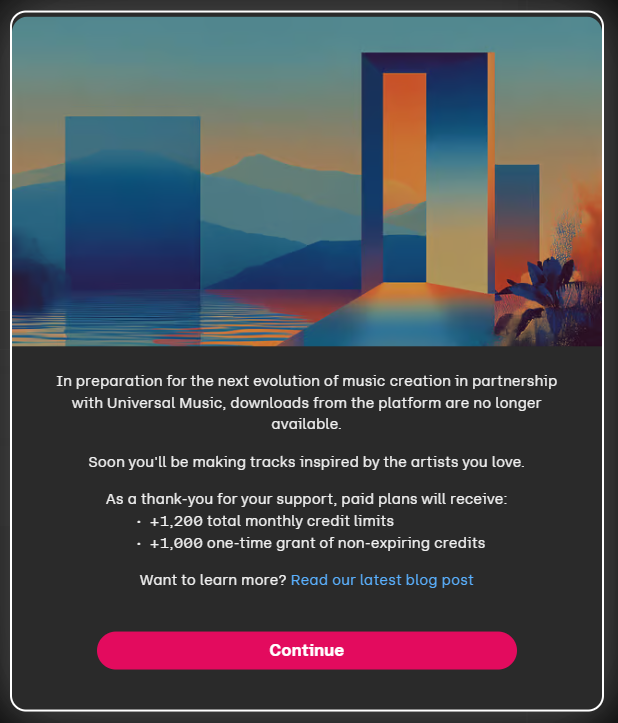Why do I love Open Source? #
Earlier today the AI music creation service UDIO announced a partnership with UMG (Universal Music Group). A partnership with UMG or any other large “media-rights” group is never a good sign. They posted a big blurb on the site about how excited they are about what the future will hold, but the immediate step they took was to prevent users of the service from downloading anything they have created on the platform. Additionally, they updated their terms of service to basically instruct users that they are not allowed to have a copy of anything they have created or use it for any creative purposes.
My strong assumption here is that UMG is NOT excited about the future of AI music generation. They’re not looking for ways to expand the capabilities, or add a wider variety of genres or capabilities to the platform. Instead, I’m sure that their true motivations are to shut down any future of music generation that might lead to them specifically not getting all the profits from sales.
Several groups had made attempts to sue UDIO and others out of business over the last couple of years, and had lost in court. The arguments have been similar to what we’ve seen from other authors and artists in the world. The objection is that these models have all been trained on copywritten work. And since they would not be able to produce the results without listening/viewing/reading all these copywritten works, then they should be either paying royalties to the artists or not allowed to operate as a result.
What a load of nonsense. As is always the case, this is not about protecting the work of the artists, but instead the argument is protecting the dollars produced by these artists, and preventing competition from entering the marketplace by controlling it.
Open Source is the antithesis of this behavior.

Everything created is derived #
In the days before AI, a person or persons would take interest in an art, such as music. They would listen to other musicians, they would learn to play instruments, and then they would create their own music. Listening to others, or viewing other’s art, or reading other’s books, and then creating your own does not mean that the artist should pay royalties to a corporation. Imagine a world where an interviewer asks and artist who their influences were, and then based on their answer fees are levied or perhaps their music is pulled from being available? The truth is that AI is no different, it draws inspiration from other works, but it’s not recreating copywritten material when it generates output. At least, not any more than a human would.
The real threat is that AI may be able to handle these same creative tasks at a higher rate, with better results than humans, and this is a threat to corporate cash and control.
What makes Open Source Different? #
In the world of Open Source, or even in some cases closed-source with permissive licensing, the products are born out of a desire to improve the world around us. There are many examples of Open Source products that offer premium support contracts, or ask for money when their software is used in business, however the way the structure their licensing is in a manner that lets the users know that the software application is the most important thing, followed by profit.
In the case of software that is used in a subscription model, or with a restrictive license, etc. You are getting a pretty clear telegraph from the company that profit is the most important aspect of the model.
Times have changed #
The digital world we live in is different from the physical world I grew up in. When I was a kid, you bought something from the store you could hold in your hand. You owned it. No one could take it away from you or change it after you became the owner.
In the digital world, many times the product is all 1s and 0s. Copying the product is easy, and therefore scarcity doesn’t play into the economic model of profit. The supply and demand aspects are typically artificial by design. Corporations that make that make millions off of digital assets spend large amounts of resources in controlling distribution. In the modern AI world, they are now also making moves to control production.
In other words, UMG and other large corporations are making their money by removing competitors and stifling innovation. It’s winning through control and subtraction, as opposed to winning through providing the best product.
My advice has always been:
- Use and remain on platforms where YOU own the output.
- Avoid subscription based services where you lose everything the minute your subscription ends.
- Avoid online-only application where you don’t control the data.
- This becomes more and more important as AI is gaining the ability to understand your data and can auto-flag or even auto-delete your data on someone else’s behalf.
- Help teams that put the software before profits make money. I know this sounds odd– but you will get whatever you incentivize.
You should own your own creativity and fruits of your efforts #
At the end of the day, you should be the owner of your time and efforts. Adobe earlier this year updated it’s license to read that they own whatever you create in their software. Facebook and other social media tell you that they can use your photos etc. for anything they would like. UMG now won’t let you download or use the music you create on the UDIO and Stability AI platforms. If they could force you to pay them to play a guitar, or borrow a paintbrush, or a word processor, they would. It’s up to the user base not to play into their hand.
